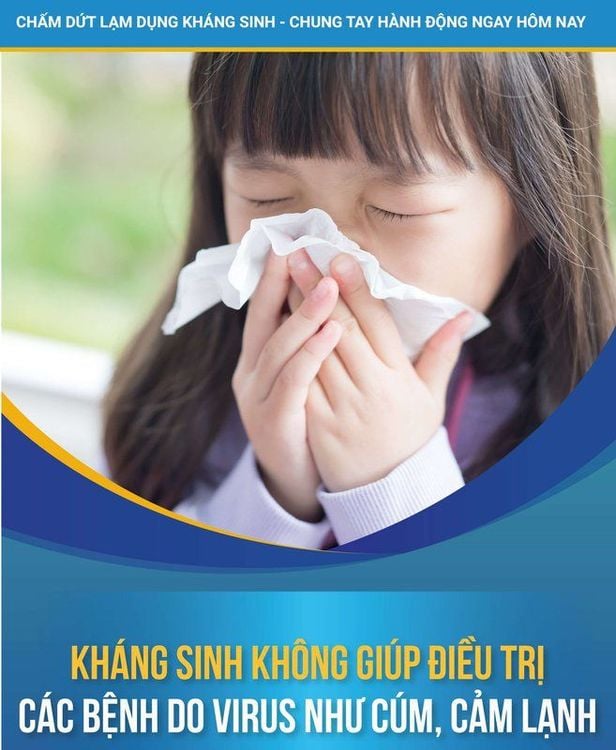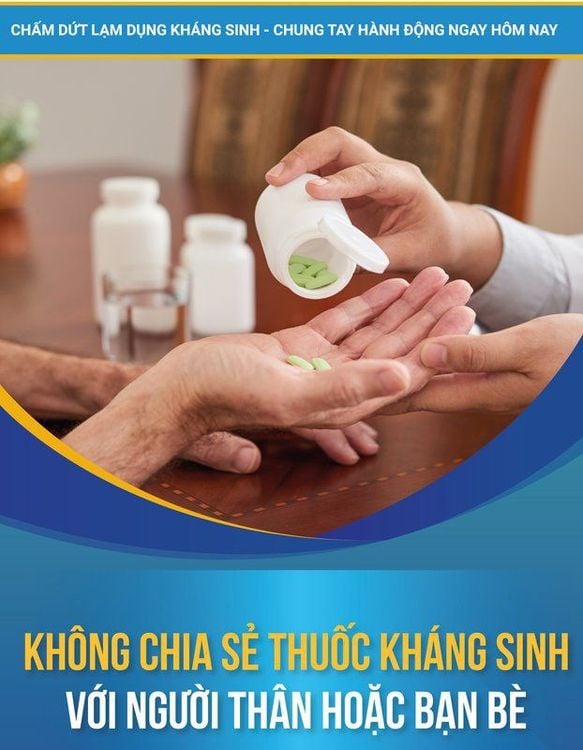This is an automatically translated article.
The article was written by Pharmacist Duong Thanh Hai - Clinical Pharmacist - Faculty of Pharmacy - Vinmec Times City International General Hospital.Antibiotics are a turning point in the history of human medicine, helping to save the lives of millions of people suffering from infectious diseases. However, antibiotic resistance is increasing dangerously to the health and development of the community. Notably, the use of antibiotics in our country has skyrocketed in the period 2009-2015 with an increase of nearly 3 times compared to the period 2005-2009, putting Vietnam on the list of countries with the highest rate of antibiotic resistance. world. “Stop overuse of antibiotics - Join hands today” with 5 principles of antibiotic use below
1. Using the wrong antibiotic reduces the effectiveness of the drug
Microorganisms are very small organisms, including bacteria, viruses, and fungi. For example, the flu virus commonly causes coughs and colds, pneumococcal bacteria can cause pneumonia, and filamentous fungi can cause skin infections. In addition, different microorganisms can be the cause of the same disease. For example: sore throat can be caused by both bacteria or viruses.. However, only diseases caused by bacteria are effective. Antibiotics only kill or inhibit the growth of bacteria, but have no effect on other types of microorganisms.Using antibiotics correctly, bacteria can learn to resist antibiotics, making them ineffective.
2. Antibiotics don't help with viral illnesses like flu, colds
Colds and flu; Most cases of pharyngitis and bronchitis (85-95%) are caused by viruses. Antibiotics are not effective in these cases.Streptococcal pharyngitis is a bacterial disease, accounting for 20-30% of sore throats in children and 5-15% of sore throats in adults. This disease needs to be treated with antibiotics according to the doctor's prescription to ensure safety and effectiveness and not cause antibiotic resistance.

3. Use the right antibiotic to ensure its effectiveness: The right antibiotic; Correct dose; The right way to use; On time
Antibiotics today have become a widely used medicine. However, the overuse of antibiotics causes resistance and other harmful effects such as: ineffectiveness, pathogenic bacteria still exist and can be transmitted to others.
4. Do not share antibiotics with relatives or friends
Don't save antibiotics for your next illness. Use the correct antibiotic your doctor prescribes. Do not skip doses. Follow the prescribed course of treatment even if you feel better. If treatment ends too soon, some bacteria may survive and cause disease again. Do not take antibiotics prescribed to others. This antibiotic may not be suitable for your condition. Taking the wrong medicine can delay the right treatment and make it worse. If your doctor determines that you don't have an infection, ask for ways to relieve your symptoms and don't ask your doctor to prescribe an antibiotic. born for you.
5. Antibiotics only when prescribed by a doctor
Strep throat is a type of infection caused by bacteria. If not treated carefully, the disease can lead to complications such as kidney inflammation or rheumatic heart disease. Treatment with antibiotics will help relieve symptoms, shorten the duration of the illness, and reduce the risk of these complications. It also helps limit the spread of disease to those around.However, in order to achieve the therapeutic effect, it is necessary to take antibiotics at the full dose and for a full time as prescribed by the doctor. Stopping antibiotics early or not taking enough doses can cause antibiotic resistance, the disease is more likely to recur and be more serious than it was at the beginning.
Always remember: take the right antibiotic, at the right dose, without missing doses, and for the full time as prescribed by your doctor, even if you feel better. Aborting the course of treatment is an opportunity for the bacteria to survive again, continue to multiply and become resistant to antibiotics.















